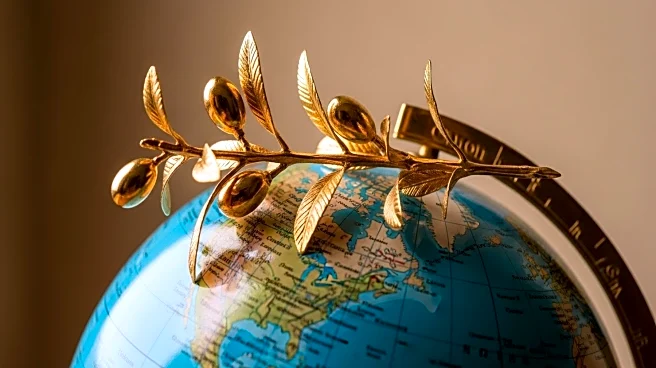What is the story about?
What's Happening?
News anchors from major U.S. networks have been dispatched to the Middle East to cover the historic ceasefire deal between Israel and Hamas, brokered by President Trump. The agreement includes the release of Israeli hostages and Palestinian detainees. ABC News, CBS News, CNN, Fox News, NBC News, MSNBC, and NewsNation are providing extensive coverage, with anchors such as David Muir, Tony Dokoupil, Kaitlan Collins, Wolf Blitzer, Jon Scott, Tom Llamas, and Katy Tur reporting from various locations including Tel Aviv, Jerusalem, Sharm El-Sheikh, and Ramallah. The coverage includes special reports and rolling news updates, highlighting the significance of the ceasefire and the involvement of President Trump, who has arrived in Israel as part of the diplomatic efforts.
Why It's Important?
The ceasefire marks a significant diplomatic achievement for President Trump and has implications for U.S. foreign policy in the Middle East. It could lead to a reduction in hostilities and pave the way for further negotiations between Israel and Hamas. The involvement of U.S. news anchors underscores the global interest in the ceasefire and its potential impact on regional stability. The release of hostages and detainees is a critical step towards peace, and the coverage by U.S. media highlights the importance of international diplomacy in resolving long-standing conflicts.
What's Next?
Following the ceasefire, attention is shifting to Egypt, where world leaders will convene for a summit on Gaza's future. This meeting could influence the next steps in the peace process and determine the role of international stakeholders in supporting the ceasefire agreement. The ongoing media coverage will likely continue to focus on developments from the summit and any subsequent diplomatic actions taken by President Trump and other leaders involved.
Beyond the Headlines
The ceasefire could have long-term implications for U.S. relations with Middle Eastern countries and influence future diplomatic strategies. It also raises questions about the role of media in shaping public perception of international conflicts and the effectiveness of U.S. leadership in global peace efforts. The coverage by U.S. news anchors may contribute to a broader understanding of the complexities involved in Middle Eastern diplomacy.
















